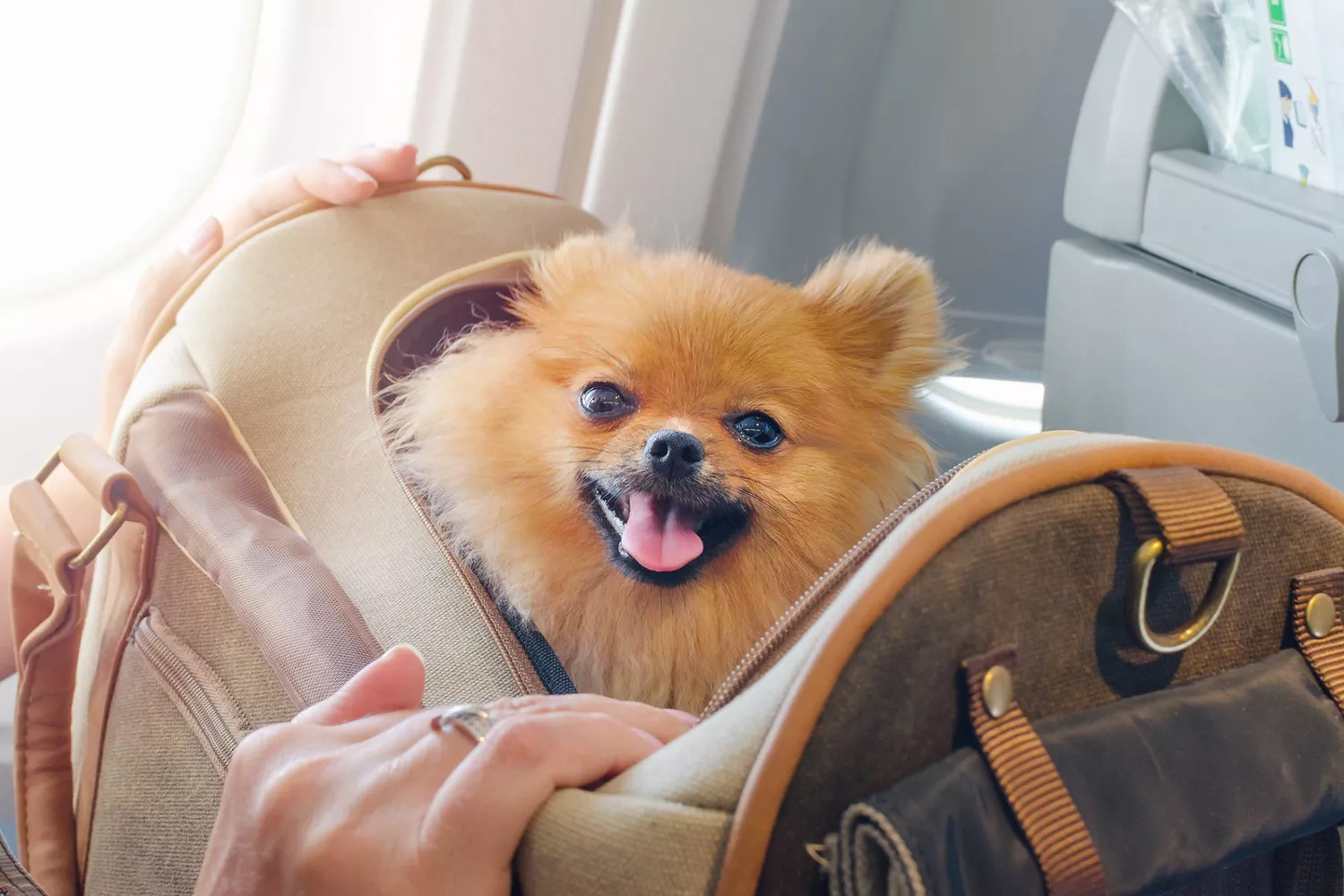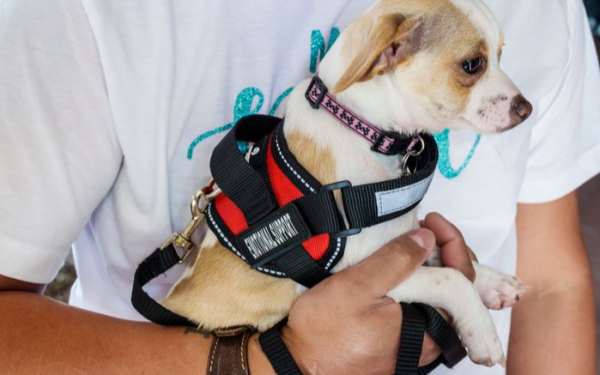United States airlines have wasted little time banning emotional support animals (ESAs) from their planes after the U.S. Department of Transportation gave them permission to do so last month.
Under the new rules, ESAs are no longer considered service animals, meaning airlines can require that they fly as regular pet dogs and cats instead of letting them occupy space in the passenger cabin.
So far, at least seven U.S. airlines have banned ESAs from their flights, some beginning as early as Jan. 11: Alaska Airlines, American Airlines, Delta Airlines, Frontier Airlines, JetBlue, Southwest Airlines, and United Airlines. Airline personnel, some of whom have been injured by ESAs, have long asked for the prohibition. So have disability and veterans groups, who’ve argued that ESAs have made it harder for legitimate service dogs to do their jobs.
Opposed to trained service dogs who help disabled people perform tasks, ESAs provide comfort to people diagnosed with physiological disorders, according to the American Veterinary Medical Association.
According to The Washington Post, an airline trade group estimated that 751,000 ESAs flew aboard commercial flights in 2017.

Alaska Airlines
The Seattle-based airline announced in early January that it will no longer allow ESAs on its planes beginning Monday (Jan. 11). Instead, only trained service dogs will be allowed to fly with their owners in the cabin.
Passengers who’ve booked travel with an ESA before Monday will be able to fly with them through February, assuming they book their travel before Jan. 11.
“This regulatory change is welcome news, as it will help us reduce disturbances onboard, while continuing to accommodate our guests traveling with qualified service animals,” Ray Prentice, the airline’s director of customer advocacy, said in a news release.
Passengers will be allowed a maximum of two service dogs. They’ll also be required to complete a DOT form, beginning on Jan. 11, attesting that their service dogs are trained, well-behaved, and vaccinated.
American Airlines
American will also ban authorized ESA travel effective Jan. 11. In a news release, the airline says existing ESA bookings will be honored through Feb. 1.
“Our team is motivated by a purpose to care for people on life’s journey, and we believe these policy changes will improve our ability to do just that,” Jessica Tyler, the airline’s president of cargo and vice president of airport excellence, said in the release. “We’re confident this approach will enable us to better serve our customers, particularly those with disabilities who travel with service animals, and better protect our team members at the airport and on the aircraft.”
Like Alaskan customers, American passengers will have to fill out the DOT paperwork attesting to the legitimacy of their service animals if they plan to fly with one.
ESAs can still travel, but they’ll have to fly the same way pets do, either as carry-on passengers or flying with the rest of the cargo.
Delta Airlines
Delta announced just after the new year that passengers could no long book travel with ESAs, effective Jan. 11. Customers who secured travel with an ESA before Jan. 11 will still be able to fly as planned.
Trained service dogs will still be allowed to fly, assuming their owners complete the necessary DOT paperwork—attesting to the dogs’ fitness, training, and health—that the other airlines require. Delta will also lift its ban on pit bull service dogs, though pit bull-type dogs won’t qualify as ESAs for people still allowed to travel with them past Jan. 11.
“Delta’s updated policy follows a nearly 85 percent increase in animal incidents since 2016, including urination, defecation and biting,” said David Garrison, the senior vice president of corporate safety and security, in a news release. “Our top priority is the health, safety and comfort of Delta customers and our people. We strongly believe this policy change will enhance the overall travel experience for everyone.”
Frontier Airlines
Beginning Jan. 11, Frontier stopped accepting reservations for people traveling with emotional support animals, a news release says. Passengers who’ve already booked travel with ESAs can still fly with their animals through the end of January.
From then on, the airline will only allow trained service dogs to travel in the cabin with their owners. Those travelers will, as you likely have already guessed, have to fill out the DOT’s paperwork so their service animal is on file before flying.
Going forward, flying with your dog or cat in the cabin will mean transporting them in a carrier that’s big enough to comfortably accommodate your dog but small enough to fit under the seat in front of you. So, small dogs only.
JetBlue
A JetBlue spokesperson told our friends at Travel + Leisure on earlier in January that the airline would no longer allow passengers to reserve tickets with ESAs—also effective Jan. 11.
“JetBlue is and has always been committed to serving those customers who require assistance or accommodations, while at the same time maintaining a safe and comfortable experience for all customers and crewmembers,” the spokesperson told Travel + Leisure.
JetBlue passengers who booked ESA travel before Dec. 20 for a flight before March 1 will still be able to fly. Customers can still fly with their pets on board, but that is limited to only small pets who would substitute for a passenger’s carry-on bag.
Southwest Airlines
Southwest announced Jan. 25 that it would no longer accept ESAs as passengers, effective March 1. From then on, only trained service dogs will be allowed to accompany their owners in the cabin, the airline said in a news release. (Some pets can still fly, but they will be relegated to their carriers.)
People traveling with service animals will have to complete Department of Transportation paperwork before flying with their animal. The forms attest to the fitness, behavior, and training of the animals.
Passengers who have already booked travel with an ESA after Feb. 28 can contact the airline for more details. Customers can still fly with pets, but that will mean extra cost and the pet will have to meet certain requirements, including size.
United Airlines
The Associated Press reported earlier in January that United Airlines will also ban emotional support animals. Effective Monday (Jan. 11), no passenger could book travel with an ESA, though people who’ve already bought tickets with ESAs can still fly through Feb. 28.
After that, only trained service dogs will be allowed to fly for free in the cabin. Passengers will, as with the other airlines, fill out the federal documentation proving that their service dog is trained and suited for air travel. Therapy dogs, however, will not count as service dogs.
Travelers can still fly with their pets, but they’ll have to pay a fee to either bring them along as a carry-on item or have them fly in the cargo hold.


